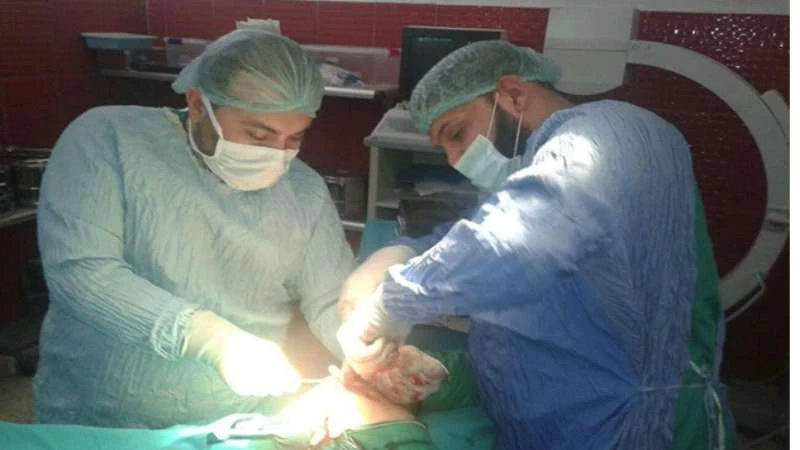Dr. Abdulrahman Obied is one of the few remaining doctors in Aleppo and Orient Net discussed with him the city’s desperate situation and the targeting of doctors and hospitals.
Q: Since the beginning of the revolution you have campaigned for the release of arrested doctors as well as provided care for the injured. Did you ever envision yourself still being involved in a war after almost six years?
A: Many doctors have been detained in Aleppo by the security and intelligence and the accusation was treating the rebels. Many of them died under torture and some are still in prisons and some chose to leave Syria.
As a matter of fact, every physician working in a field hospital in Aleppo is subject to arrest and murder. The evidence for that is the intensity of the deliberate targeting of hospitals with bombs by military jets that led to the deaths of a large number of doctors and medical staff. Most of Aleppo’s hospitals are now out of service. After six years of war, the level of daily killings and the victims are still increasing.
Q: Do you still have professional nursing and medical staff to assist you or do you find yourself training and educating anyone who is available in the basics of first aid and life support?
A: Physicians, nursing staff and supplies are inadequate in the remaining hospitals of Aleppo. The doctors who are here find themselves training whoever has a desire to do medical work in these difficult conditions. Often physicians are having two roles – the role of a physician and a nurse at the same time due to the lack of medical staff – and this increases the burden on us.
Q: Do you continue to treat civilians for general health issues as well as for injuries?
A: The intensity of the non-stop bombardment by barrel bombs and missile attacks for several years have led to a large number of wounded and changed the way we treat civilians. Most of our work is now focused on treating emergency cases giving priority to those with the most severe injuries.
Q: Are there any war related diseases that you have witnessed during your practice in this hospital?
A: For me as an orthopedic surgeon, I see many diseases related to the war – for instance; permanent neurological disabilities, amputations of limbs, paralysis and acute inflammations that do not respond to conventional treatments.
Q: Do you have specialty physicians still working in your area of Aleppo?
A: Specialized physicians are very few. Most of them immigrated to Europe and this has caused a major medical problem in the face of the severity, as well as the variety of injuries we encounter.
Q: Do you believe physicians have a duty to treat wounded prisoners?
A: As a physician my humanitarian duty compels me to continue working in these critical circumstances and I treat any patient who is brought to the hospital, regardless of any affiliation or ethnicity.
My main concern is to provide the best medical treatment possible with the limited resources available to us.
Q: Do you have patients suffering from Post-Traumatic Stress Disorder and do you have a psychologist or a psychiatrist available for treating civilians?
A: There are a lot of victims who, even after their physical wounds heal, are left with serious psychological wounds that have not yet healed. The most significant ones are fear, anxiety, insomnia, despair, a sense of helplessness and psychological collapse.
Psychiatrists are not available in our area for the treatment of these cases.
Q: Do you consult outside doctors via telemedicine and seek second opinions regarding some cases you face in Aleppo?
A: There are some physicians in Aleppo in touch with doctors abroad to consult them in risky, critical cases and conditions.
As for the rest of the cases, they are referred to Turkey for treatment.
Q. How are you managing to deal with the shortage of narcotics in the liberated areas of Aleppo?
A: There is a shortage of anesthetics and other drugs such as antibiotics, pain killers and IV lines.
The reason for that is the random medical work of many medical NGOs supporting the medical sector in the liberated areas.
Q: In the midst of so much death and destruction, has it gotten easier to tell a family that their son or loved one has died?
A: After six years of destruction and war, death has become a normal thing and expected by anybody, anywhere at any time.
Assad and Russian jets do not exclude anything and targeting hospitals, schools, bakeries and community gatherings are being done deliberately in order to achieve the greatest amount of death, destruction and victims.
In the end, my only hope is to stop the killing and daily bloodshed, with God’s will.



التعليقات (0)